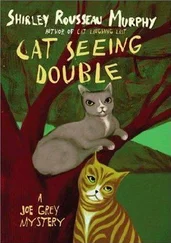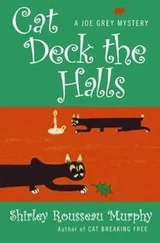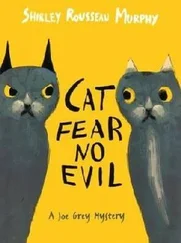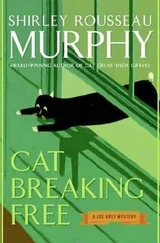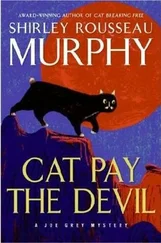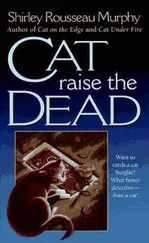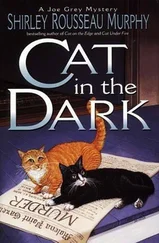
Moonlight touched Jolly's alley; a little breeze fingered between the small shops, stirring leafy shadows; the potted trees shivered; the glow from a wrought-iron lamp mingled with moonlight washing across the many-paned shop windows, brightening the rainbow colors of a stained-glass door. The brick paving was warm beneath the cats' hurrying paws.
Intent on their destination, neither cat spoke. Dulcie was all nerves. Joe was edgy with a need to run-to climb-to fight. They found it hard to stay focused, their spirits, their cat souls, wanted to be elsewhere. This was not a good night for measured discipline. The windy moonlight pulled at them, sought mightily to draw them away. They were filled with ancient hungers, with the moon's wild power, with mysteries surfacing from a vanished past.
Just as the hills above them, so ordinary in daylight, changed under the moon to dangerous veldts and tangled black jungles, so the cats' souls were changed. Ancient yearnings rode with them, drawing them like addicts toward lost times where medieval shadows fled.
Dulcie glanced at Joe and shuttered her eyes, trying to keep her thoughts on their mission. Slowing her pace, she padded demurely beside him. Leaving the alley, turning up the sidewalk, they put on civilized faces. Bland, kitty faces. With effort they returned to the domestic, became simple wandering pets, idle, dawdling.
Curving gently around planters and benches, duly sniffing at the shop walls, they stopped to investigate a bit of paper dropped at the curb. They scented mindlessly along a row of flowerpots. They meandered, working their way aimlessly in the direction of the Aronson Gallery, pretending vague inattention-but watching intently the gallery's broad bay windows and glass door. The Aronson, occupying a quarter square block, was the most prestigious of Molena Point's fifty galleries.
At the curb opposite the wide, low windows, Joe nosed at one of four huge ceramic pots planted with pink flowering oleander trees. Leaping up, he stretched out on the warm, potted earth; below him, Dulcie rolled on the sidewalk, both cats feigning empty-minded boredom as they studied the brightly lit interior, a montage of angled white walls and jagged, multicolored reflections more familiar to Dulcie than to Joe. A medley of colliding surfaces as intricate as the interior of a kaleidoscope, its maze of short, angled walls provided dozens of pristine white recesses flowing from one to another. Each niche accommodated a single painting, much as a jeweler displays one perfect emerald or ruby on a bed of velvet. The viewer could see each canvas or watercolor in isolation, yet had only to turn, perhaps take a step, to be immersed in the next offering. The snowy spaces blended so smoothly that gallery patrons seemed to wander in an open and airy world, surprised at each turn by a new and bright vista.
Now from deep within, three figures moved, approaching the front, their progress broken into crooked shadows. They seemed to be the gallery's only occupants. Sicily floated theatrically toward the door, her loose, drifting garments almost ethereal beside the staid figures of the couple who accompanied her. The middle-aged man was nicely attired in a raw silk sport coat and pale slacks, the thin woman elegant in a sleek black cocktail suit, her shining black hair pinned into a chignon, her huge silver earrings dangling and flashing in the gleam of gallery lights. The three paused in the open doorway, stood discussing painting prices. The cats listened and watched narrowly, pretending to nap, but tensed for the moment when back would be turned, and they could dart inside. The couple seemed undeterred by the cash sums Sicily was mentioning, money enough to keep the entire cat population of Molena Point in gourmet abundance for the next century. One of the paintings they were discussing was Janet's, a canvas the cats could see inside on the gallery wall, a painting of dark, rainswept hills.
But at last the man and woman stepped onto the street, and as Sicily turned back into the gallery the cats streaked through behind her. Racing for the shadows, they crouched between the zigzag walls. Looking out, they could just see Sicily as she moved away toward the back, unaware of intruders. Above them in the alcove hung a stark painting of a tilting San Francisco street, a work too austere for Dulcie's tastes, and seeming to Joe hard and ugly.
And now, though Dulcie knew the gallery well, confusion touched her. As she peered away among the alcoves, searching for a better place to hide, she was riven with uncertainty. The gallery spaces seemed different tonight, the vibrant colors of the paintings seeming to shatter and converge in strange new convolutions beneath the dizzying lights.
They heard Sicily pick up the phone and punch in a number, listened to her arrange late dinner reservations for four at the Windborne, Molena Point's most luxurious restaurant. This distracted Dulcie. She was able to calm herself with visions of a lovely, leisurely meal at a linen appointed table, waited on by liveried servers as she gazed down through the glass wall to the rolling sea below. Dreaming, she began to relax.
And at last she licked her paw and smoothed her whiskers, preparing for the night's work.
As they crouched in the shadows, Sicily returned to the front wearing a wrap, an African-looking shawl thrown over her shoulders, and jingling her keys. She swept past them, carrying a briefcase and a string handbag, pausing at the door to turn out the lights.
The gallery dimmed to a soft glow from the streetlamps. Through the open door a cool breeze fingered in, then abated as Sicily pulled the door closed.
She locked the door with her key and swept away down the street; in a moment they saw her white van go by, and realized they had passed it a block away.
She was gone; the gallery was theirs. They came out from the shadows to prowl the pale recesses, studying each canvas, each glassed and matted watercolor, searching for Janet's work, but by the time they reached the back of the gallery they had found only five of her paintings. And none of these was new; Dulcie had seen them all in the gallery, long before the fire. In the dim light, the life and color of the work was nearly lost. Only the strong dark and light patterns remained, as if the paintings had turned into photographs of themselves.
Deep in the interior, beyond Sicily's desk, four closed doors were half-hidden among the oblique walls. They pawed each open. One led to a rest room smelling powerfully of Pine Sol, one to a closet with a red sweater dangling among a row of empty hangers. The third door opened on a cleaning closet: broom, mop, various cleaning chemicals in assorted spray bottles. The fourth door, to the storeroom, was open, as if perhaps Sicily left it ajar for air circulation.
And at the very back a fifth door, a broad, metal-sheathed loading door leading to the alley, was sealed by a bar and a padlock. Uneasily, Joe looked up at it.
This door was impassable. And Sicily had locked the front door with a key. There was no other way out of the gallery. The realization that they were trapped made him feel as helpless as when, as a kitten, he'd been chased into San Francisco's dead-end alleys by packs of roaming dogs or by nasty little street boys.
He shivered as they slipped into the storeroom. "You said there were no windows?"
"None. If we can throw the light, it won't be seen. The switch is there…" She peered up, then pawed the door closed behind them, so light wouldn't be seen from the street.
Joe paced, tightening muscles, staring up. He leaped.
On his third try, scaling up the wall, his paw hit the switch. The lights blazed, three sets of long fluorescent bulbs burning in a white, blinding glow.
Читать дальше


